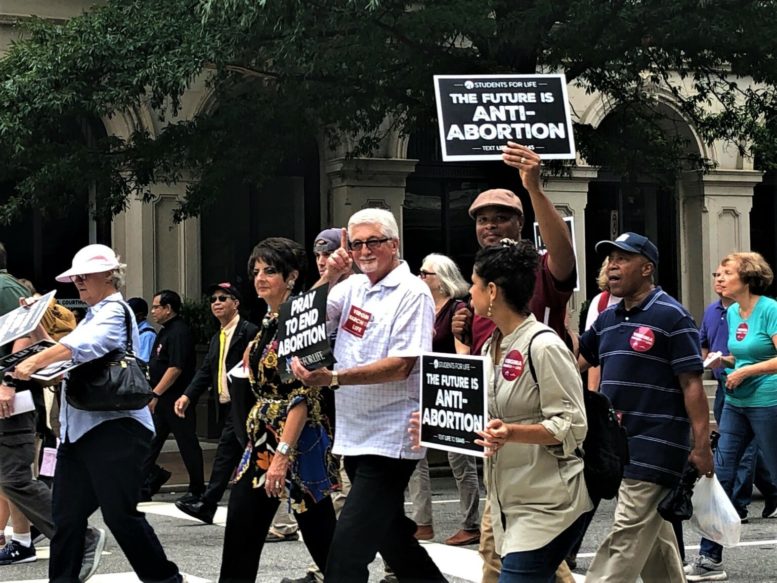BY SUSAN TEBBEN
The Ohio House will consider a new abortion regulation that would keep some doctors from being able to work with abortion clinics and could cause felony charges for doctors working on complicated pregnancies.
Senate Bill 157 passed through the House Families, Aging and Human Services Committee on Tuesday, approved along party lines. It has already been approved in the Ohio Senate. (State Sen. Theresa Gavarone, R-Bowling Green, co-sponsored and voted in favor of the bill.)
The bill would expand the charge of abortion manslaughter, already on the books in Ohio, to include a physicians’ failure to “take measures to preserve the health of a child born alive after abortion,” according to the bill documents.
Under the legislation, a physician who conducts an abortion but finds the fetus is still alive after the abortion to provide life-preserving care, something that opponents of the bill have said is already a part of state law and medical procedure.
There is also a provision in the bill that requires the Ohio Department of Health to develop a “child survival form” for a physician to complete if a child is born alive after an attempted abortion, and for ambulatory surgical facilities to submit monthly and annual reports to the ODH.
The ODH already compiles an annual abortion report based on medical reports signed by physicians of abortions conducted in the state. The report also includes complications, including “failed abortions” that happen in the state and a narrative on the complications.
The bill’s sponsors referred to an abortion in which a child is born alive as a “botched abortion,” but state data shows the occurrence as a “failed abortion.” According to the most recent years of data on abortions in the state, “failed abortions” are rare, and did not happen in any pregnancies that were viable.
An amendment made while the bill was in the Ohio Senate prohibits physicians who are funded through a public institution’s medical school from being a part of abortion clinics written transfer agreement variances, which allow a patient to be transferred to a hospital where the physician practices in the case of emergencies.
Physicians who teach at public medical schools are also not allowed to serve as a consulting physician for abortion-related surgical facility, or the variance can be rescinded, according to the bill.
Democrats attempted to insert amendments into the bill, including one from state Rep. Allison Russo, D-Upper Arlington, that would remove the transfer agreements variance regulation. Russo furthered an argument made by abortion rights proponents in previous testimony against the bill by saying the regulation “effectively bans and removes access to abortion,” particularly in Southwest Ohio, where two abortion clinics are located.
“These are medically unnecessary agreements, but on top of that, because of the broad language, this does ban and remove abortion access for one part of the state in Southwest Ohio,” Russo said.
State Rep. Beth Liston, D-Dublin, introduced an amendment that would take away the word “health” from the bill, leaving the bill to involve a baby’s “life,” which Liston said gives doctors more freedom to do what they feel is best in complicated births and pregnancy plans. Her amendment also sought to remove a requirement that a physician be charged with a third-degree felony for failing to file forms.
“I think that these changes would minimize the downstream impacts and harm that we might see from this legislation in some small ways,” Liston said.
Both amendments were quickly voted down along party lines without further discussion.
The bill now heads for full House consideration, scheduled for 1 p.m. Wednesday.
Abortion is legal in the state of Ohio up to 22 weeks gestation.
***
Also from Ohio Capital Journal:
Commentary: Supreme Court decision limiting access to abortion could harm the economy and women’s well-being
By Michele Gilman, University of Baltimore
The Supreme Court on Dec. 1, 2021, heard oral arguments in a case that may result in a ruling that overturns Roe v. Wade.
But reproductive health isn’t just about abortions, despite all the attention the procedures get. It’s also about access to family planning services, contraception, sex education and much else – all of which have also been under threat in recent years.
Such access lets women control the timing and size of their families so they have children when they are financially secure and emotionally ready and can finish their education and advance in the workplace. After all, having children is expensive, typically costing almost US$15,000 a year for a middle-class family. For low-income working families, child care costs alone can eat up over a third of earnings.
And that’s why providing Americans with a full range of reproductive health options is good for the economy, at the same time as being essential to the financial security of women and their families. As a law professor who represents people experiencing poverty, I believe doing the opposite threatens not only the physical health of women but their economic well-being too. READ MORE
Senate GOP signals skepticism on vaccine mandate ban
Several Republicans in the Ohio Senate indicated reluctance to legislation prohibiting universities, employers, and most health care facilities from requiring vaccination against COVID-19.
All but one Republican in the chamber passed House Bill 218 last month (with State Rep. Haraz Ghanbari, R-Perrysburg voting in favor), overriding objections from business, health care, and public health organizations. During Senate committee reviews and interviews Tuesday, however, some Republicans said they didn’t want to pass a law blocking private businesses or schools from passing vaccine mandates if the employers deem it appropriate.
“I think businesses should make the decisions on this,” said Sen. Bob Hackett, R-London.
Hackett and two other Senators who made similar comments have aligned on the issue with both Gov. Mike DeWine and powerful large-business lobby groups like the Chamber of Commerce and Ohio Business Roundtable. They said they oppose the federal government’s vaccine mandates for health care providers and large employers from President Joe Biden, and they oppose any state legislation that prohibits employers from making mandate decisions for themselves.
The Senate consideration comes as Ohio, the 9th least vaccinated state in the nation according to The New York Times, experiences its third major case surge of COVID-19 and a respiratory virus-friendly winter looms. More than 4,200 Ohioans are currently in the hospital with COVID-19, the heaviest patient load since January 6, 2021, per data from the Ohio Hospital Association. READ MORE
Investigation urged of doctor who operated on immigrant women in detention
WASHINGTON — Two congressional panels are calling for Secretary of Homeland Security Alejandro Mayorkas to investigate a doctor who was accused of performing gynecological procedures on immigrant women in a Georgia detention center without their consent or full understanding of the treatment being performed.
In a Dec. 3 letter, Democrats on the House Homeland Security and Oversight & Reform committees demanded that Dr. Mahendra Amin be prevented from giving medical treatment to migrants in U.S. Immigration and Customs Enforcement detention centers.
They also asked the Department of Homeland Security to outline what steps the agency is taking to provide migrants with appropriate medical care.
The Democrats also said they are concerned that Amin “may have been performing unnecessary surgical procedures to defraud DHS and the Federal government without consequences.”
“We are also concerned that people at other detention facilities may be receiving similarly inappropriate or inadequate medical treatment,” they said. READ MORE





